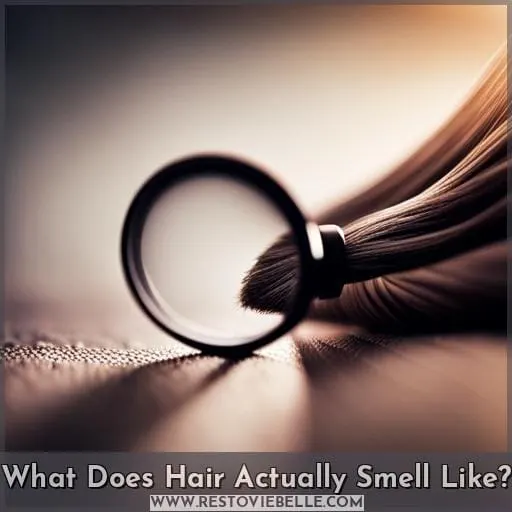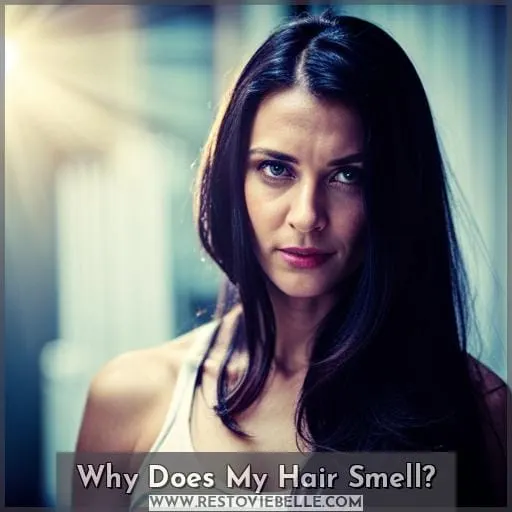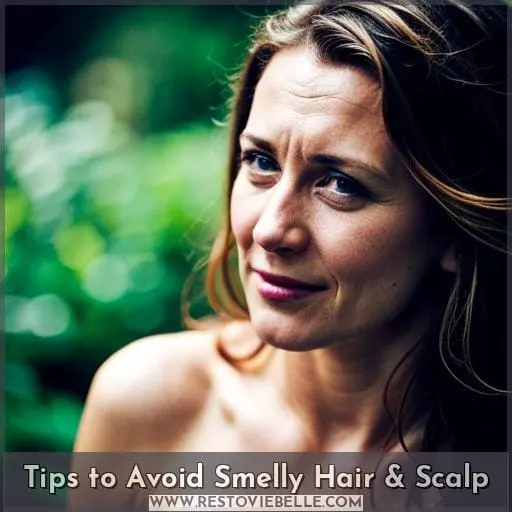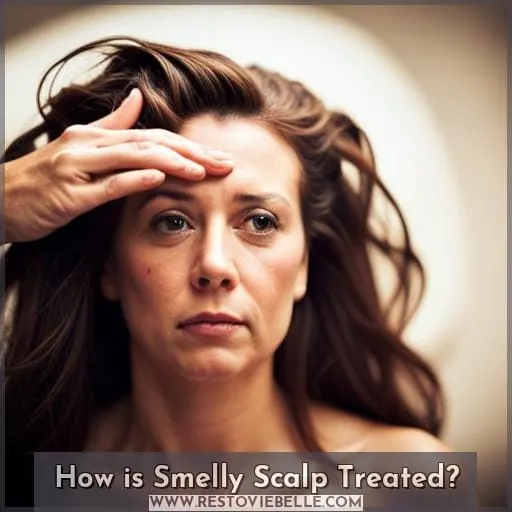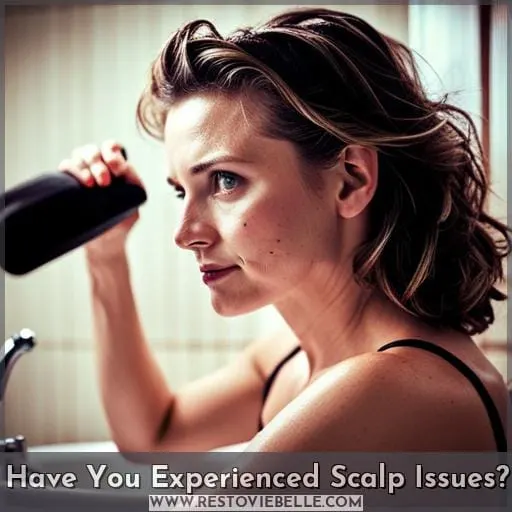This site is supported by our readers. We may earn a commission, at no cost to you, if you purchase through links.
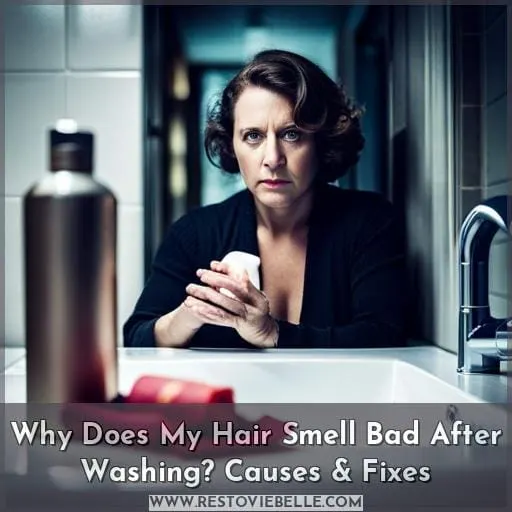 Smelly hair days plague even the most fastidious among us. As you scratch your head wondering why your locks reek post-shampoo, consider an oily scalp, dead skin cells, or product buildup as the offender.
Smelly hair days plague even the most fastidious among us. As you scratch your head wondering why your locks reek post-shampoo, consider an oily scalp, dead skin cells, or product buildup as the offender.
To banish unpleasant hair odors, examine your hair care regimen – from shampooing frequency to styling products. With some tweaks, you can bid adieu to bad hair days and enjoy locks that smell as fresh as they look.
Table Of Contents
- Key Takeaways
- What Does Hair Actually Smell Like?
- Why Does My Hair Smell?
- Tips to Avoid Smelly Hair & Scalp
- Why Does My Hair Smell Bad After I Wash It?
- How is Smelly Scalp Treated?
- Have You Experienced Scalp Issues?
- Frequently Asked Questions (FAQs)
- Can hormonal changes cause my hair to smell bad after washing it?
- How can I prevent my hair from smelling bad after I wash it?
- What are some common causes of smelly hair after showering?
- Should I see a doctor if my hair still smells bad even after trying different solutions?
- Can using certain hair care products contribute to smelly hair after washing?
- Conclusion
Key Takeaways
- Not washing hair frequently enough allows sweat, sebum, and dead skin cells to build up, leading to a smelly scalp and hair.
- Sweat mixing with bacteria can cause an unpleasant odor in the hair.
- Pollution can contribute to smelly hair due to the accumulation of pollutants on the scalp and strands.
- Targeted solutions such as clarifying shampoos, medicated formulas, blow drying, and brushing can help eliminate unwanted smells in the hair.
What Does Hair Actually Smell Like?
When you first step out of the shower, your clean hair typically has no real smell or smells lightly like the fragrances used in hair care products.
Healthy hair and a clean scalp shouldn’t have much of a scent at all. The natural oils secreted by your scalp have little to no odor, resulting in hair that smells neutral when properly cleaned.
However, everyone’s body chemistry differs slightly, so there can be subtle natural smells from person to person. As long as your hair doesn’t give off a strong or unusual odor, it likely falls within the range of normal.
Sweat and excess oil buildup can make hair smell over time, but clean, fresh strands tend to be fragrance-free or have a very faint, clean scent.
Monitoring your hair’s smell and maintaining good hygiene habits can help preserve the natural, neutral smell of healthy hair.
Why Does My Hair Smell?
Not washing your hair frequently enough allows sweat, sebum, and dead skin cells to build up. This buildup, combined with pollution and other environmental factors, can lead to smelly hair.
To prevent smelly hair after washing, shampoo regularly and thoroughly rinse all product out after each wash.
Not Washing Enough
If you don’t wash your hair frequently enough, it can start to develop an unpleasant smell.
Not washing your hair regularly allows for the buildup of oils and sweat on the scalp, which can lead to a smelly scalp and hair.
Additionally, not cleansing your hair properly may result in residue from styling products or environmental pollutants accumulating on the strands, causing them to emit an odor.
Sweaty Hair
After not washing your hair enough, the next reason why your hair may smell is if you have sweaty hair.
Sweat glands on the scalp produce sweat, which can mix with bacteria and cause an unpleasant odor.
To combat this issue, make sure to wash your hair regularly with a gentle shampoo and conditioner that are suitable for oily scalps. Additionally, avoid using hot water on your head as it can stimulate more sweat production.
Natural remedies like lemon juice or apple cider vinegar rinses can also help eliminate odor-causing bacteria from the scalp.
Pollution
To combat pollution, protect your hair from sun damage and environmental toxins by wearing a hat or scarf.
Pollution can contribute to smelly hair due to the accumulation of pollutants on your scalp and strands. These pollutants can mix with oils produced by your scalp, leading to an unpleasant odor.
Additionally, pollution particles can clog pores on the scalp, causing issues like seborrheic dermatitis and yeast infections that further contribute to smelly hair.
Regularly washing your hair is crucial in removing these pollutants and maintaining a fresh scent.
Tips to Avoid Smelly Hair & Scalp
Preventing smelly hair and scalp by using sulfate-free shampoos and wearing hats or scarves when outdoors can help minimize odor issues.
Here are some tips to help avoid smelly hair and scalp:
- Use sulfate-free shampoos. Sulfates can strip hair of its natural oils, leading to an overproduction of oil and bacteria buildup.
- Wear a hat or scarf outdoors. Covering hair protects it from sun damage, pollution, and environmental contaminants that can cause odor.
- Wash hair more often if you have an oily scalp. Getting rid of excess oil and product buildup prevents bacteria overgrowth.
Managing stress, improving diet, using essential oils, and sticking to a solid hair care routine can also prevent smelly hair issues. If problems persist despite these methods, see a doctor to rule out skin conditions or hormone imbalances.
Why Does My Hair Smell Bad After I Wash It?
Despite using your normal hair care routine, your locks sometimes give off an unpleasant odor in lieu of smelling fresh and clean after washing.
| Cause | Description | Solutions |
|---|---|---|
| Hard water | Mineral deposits build up on hair | Use clarifying shampoo, install water softener |
| Mildew | Grows on wet hair and scalp | Blow dry hair thoroughly after washing |
| Oily scalp | Traps bacteria causing smells | Use dandruff shampoo, exfoliate with scalp brush |
| Fungal infections | Yeast and fungi on scalp | Antifungal creams, medicated shampoos |
| Seborrheic dermatitis | Scaly, oily, itchy skin condition | T/Gel shampoo, see a dermatologist |
As you can see, several factors like hard water residue, mildew, and skin conditions can make hair stinky post-wash. Fortunately, targeted solutions like clarifying shampoos, medicated formulas, blow drying, and brushing can help eliminate unwanted smells.
If home remedies don’t work, seeing a dermatologist checks for and treats underlying scalp issues. With some trial and error, you can get your locks smelling fresh again after sudsing up.
How is Smelly Scalp Treated?
You’re on your way to banishing bad hair days by seeking advice from your dermatologist, who can pinpoint the cause and guide you to solutions like medicated shampoos for treating scalp fungus or oral medications that regulate out-of-balance hormones.
To treat smelly scalp, your dermatologist may recommend:
- Medicated shampoos to reduce bacteria buildup
- Antifungal creams for fungal infections
- Hormonal medications to address hormonal changes
Additionally, you can take measures at home by changing hair care products, tracking your diet, and washing your hair more or less often.
Don’t try drastic treatments on your own. Seeking professional medical advice is key to determining the root cause, whether it’s dandruff, scalp psoriasis, fungus, hormonal changes, hyperhidrosis, or even pollution.
With the right diagnosis and treatment plan, you’ll be back to fresh, clean-smelling locks.
Have You Experienced Scalp Issues?
If you’ve been dealing with scalp issues, such as dandruff or itching, it’s important to find the underlying cause and seek appropriate treatment.
Scalp issues can be caused by various factors, including dandruff, seborrheic dermatitis, oily scalp, dry scalp, and more.
Dandruff is a common condition characterized by flaking of the skin on your scalp.
Seborrheic dermatitis is another skin condition that causes redness and greasy scales on the scalp.
An oily scalp can result in excess oil production that leads to a greasy buildup on your hair follicles.
On the other hand, a dry scalp may cause flaking and itching due to lack of moisture.
Scalp issues like these can be frustrating and uncomfortable but rest assured there are solutions available for each problem you might encounter.
Whether it’s using an anti-dandruff shampoo for flakes or seeking medical advice for severe cases like seborrheic dermatitis or hair loss/thinning related concerns.
It’s crucial not only to address these problems but also maintain proper hygiene practices such as washing regularly with gentle shampoos suited for specific conditions while avoiding harsh chemicals that could aggravate existing symptoms even further.
By understanding what might be causing your specific issue(s)and taking appropriate action accordingly; finding relief from any discomfort should become achievable!
Frequently Asked Questions (FAQs)
Can hormonal changes cause my hair to smell bad after washing it?
Hormonal changes can contribute to bad-smelling hair after washing.
These changes can impact oil production on the scalp, leading to a buildup of sebum and bacteria.
Consulting a healthcare provider may be beneficial for further evaluation and treatment options.
How can I prevent my hair from smelling bad after I wash it?
Use a clarifying shampoo regularly.
Allow hair to dry thoroughly before styling.
Reduce frequency of oily hair products.
Treat any scalp conditions promptly.
Avoid wearing hats immediately after washing.
What are some common causes of smelly hair after showering?
Mildew, hard water residue, oily scalp buildup, fungal infections, and conditions like seborrheic dermatitis can trap bacteria on your scalp and hair, causing bad smells after showering.
Using clarifying shampoos, blow drying thoroughly, treating medical conditions, and improving water quality can help eliminate smelly hair.
Should I see a doctor if my hair still smells bad even after trying different solutions?
Yes, you should see a doctor if your hair still smells bad after trying different at-home solutions. A lingering foul odor could indicate an underlying scalp condition that requires medical attention. Don’t hesitate to make an appointment with your physician or dermatologist to identify and properly treat the cause.
Can using certain hair care products contribute to smelly hair after washing?
Certain hair products can contribute to smelly hair after washing.
Ingredients like silicones can build up on your hair over time, trapping oils and sweat against your scalp. This creates an ideal environment for bacteria and fungi to multiply, producing bad odors.
Switching to sulfate-free shampoos without silicones may help prevent buildup and smelly hair.
Conclusion
To ensure your hair smells fresh after washing, it’s important to identify the root cause of the unpleasant odor.
Factors such as not washing enough, sweaty hair, and pollution can contribute to smelly hair.
By adjusting your hair care routine, including regular shampooing, using appropriate products, and keeping your scalp clean, you can prevent bad odors.
If you’re experiencing persistent scalp issues, it’s best to consult a professional for proper treatment.
Don’t let smelly hair ruin your day – take control and enjoy fresh-smelling locks.
